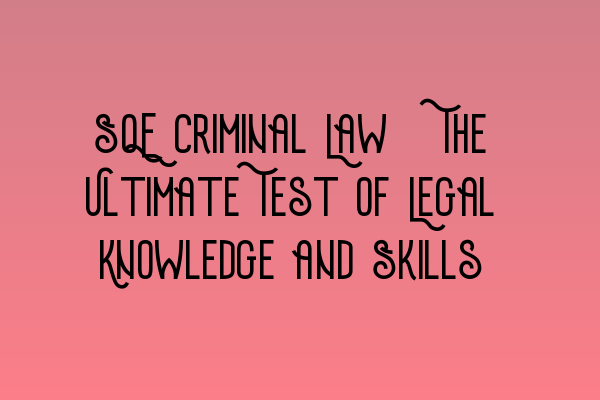SQE Criminal Law: The Ultimate Test of Legal Knowledge and Skills
The Solicitors Qualifying Examination (SQE) is the new assessment method introduced by the Solicitors Regulation Authority (SRA) for individuals seeking qualification as solicitors in England and Wales. It has brought significant changes to the legal profession, offering a streamlined and standardized approach to legal education and assessment. In this blog post, we will specifically focus on SQE Criminal Law, which is a crucial part of the SQE 1 assessment.
What is SQE Criminal Law?
SQE Criminal Law is one of the key subject areas covered in the SQE 1 assessment. It tests candidates’ knowledge and understanding of criminal law principles, procedures, and substantive law. This part of the exam evaluates their ability to apply legal principles to practical scenarios and analyze criminal law issues.
To effectively prepare for the SQE Criminal Law exam, it is essential to have access to comprehensive study materials and resources. SQE 1 preparation courses play a crucial role in helping candidates develop a solid understanding of criminal law concepts and enhance their problem-solving skills.
Mastering Criminal Law for the SQE Exam
To excel in SQE Criminal Law, candidates should focus on acquiring in-depth knowledge of the fundamental principles of criminal law and procedure. They need to be familiar with key concepts such as actus reus, mens rea, and strict liability. Furthermore, understanding the elements of various criminal offenses, defenses, and evidentiary rules is essential.
Effective exam preparation requires regular practice and revision. Candidates should utilize SQE 1 practice exam questions and SQE 1 practice mocks (FLK1, FLK2) to strengthen their knowledge and identify areas for improvement. These resources simulate the exam environment and provide candidates with valuable insight into the types of questions they might encounter.
Additionally, participating in SQE 2 preparation courses can further enhance candidates’ understanding of criminal law by exploring advanced topics and complex legal scenarios. These courses also assist in refining critical legal skills, such as legal research, analysis, and professional judgment.
Key Skills Assessed in SQE Criminal Law
The SQE Criminal Law assessment evaluates candidates’ ability to apply legal knowledge to practical scenarios and analyze complex criminal law issues. It assesses their skills in the following areas:
1. Legal Analysis: Candidates must be able to identify relevant legal issues, analyze factual scenarios, and apply the appropriate legal principles and precedents.
2. Problem-Solving: The exam tests candidates’ ability to propose practical solutions to legal problems and evaluate the implications of different courses of action.
3. Legal Research: Proficiency in conducting effective legal research is crucial. Candidates should be adept at locating and interpreting legal sources, such as statutes, case law, and legal commentary.
4. Drafting Legal Documents: SQE Criminal Law may require candidates to draft legal documents, such as memorandum of advice, witness statements, or case summaries. Clear and concise writing skills are essential.
5. Professional Judgment: Candidates are expected to demonstrate ethical and professional judgment when analyzing legal scenarios and making decisions in line with legal principles and professional conduct rules.
Important Dates for the SQE Exam
It is essential to stay updated with the SRA SQE exam dates, including registration deadlines, exam windows, and result release dates. Planning and scheduling your preparation according to these dates will ensure timely completion of the SQE assessment.
In conclusion, SQE Criminal Law is a significant component of the SQE 1 assessment, demanding a comprehensive understanding of criminal law principles and the ability to apply them in practical scenarios. Candidates aspiring to become solicitors should make use of SQE 1 preparation courses and practice resources to improve their knowledge and skills. By mastering criminal law and excelling in the SQE exam, aspiring solicitors can embark on a rewarding legal career.
